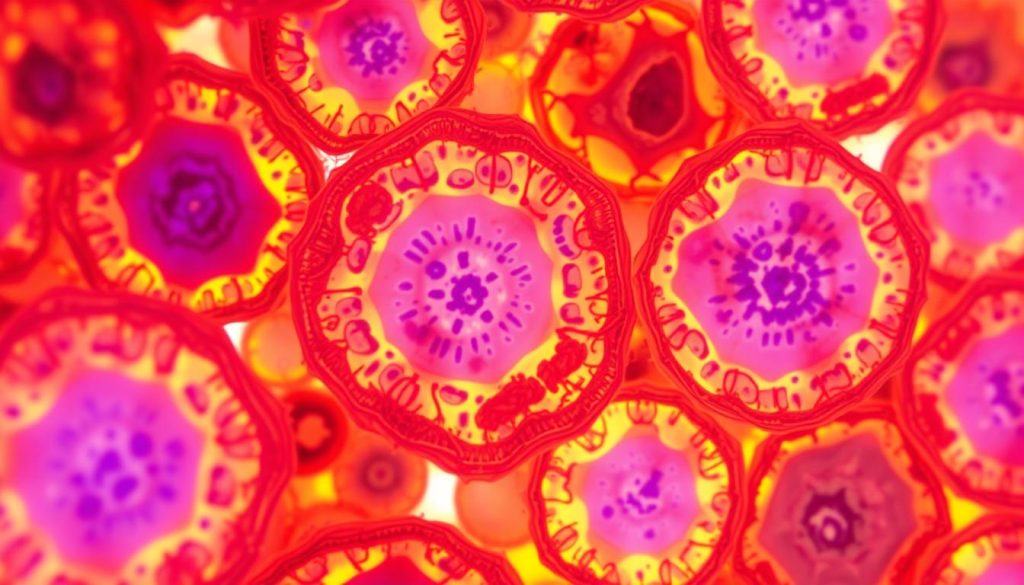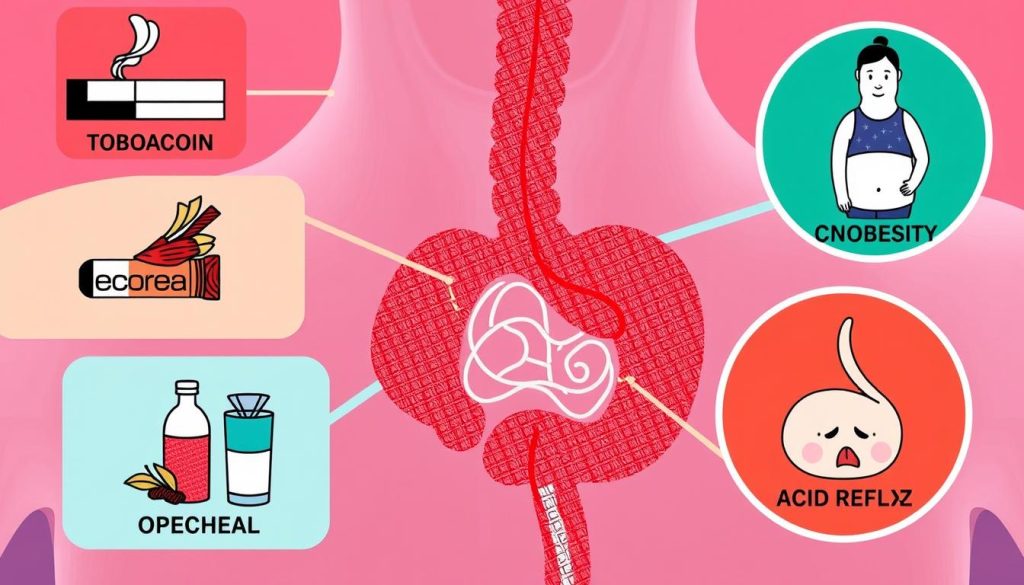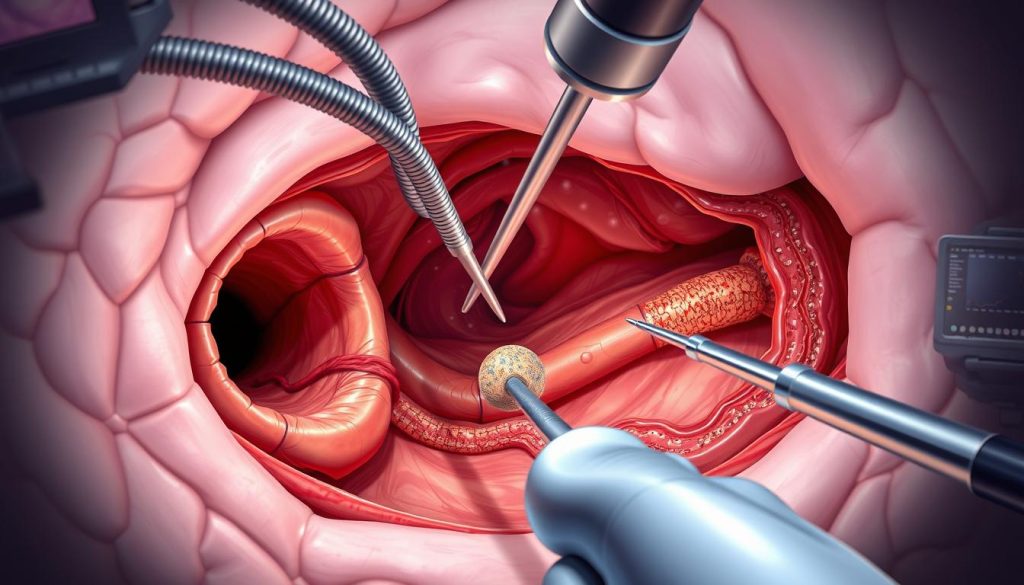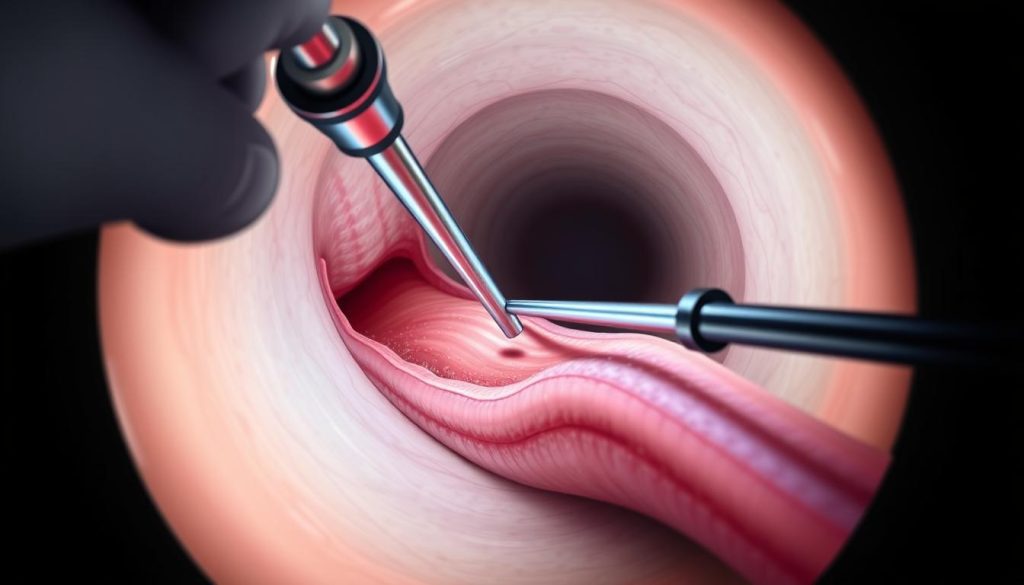Esophageal cancer is a tough challenge in the world of cancer research. It affects the esophagus, the tube that connects our throat to our stomach. We will look into the details of esophageal carcinoma and how it impacts people’s lives.
An esophagus tumor can start in different ways. Each has its own risk factors and treatment methods. Knowing the causes of this disease is key for prevention and care.
New discoveries in medicine bring hope to those with esophageal cancer. Treatments like targeted therapies and minimally invasive surgeries are getting better. They help improve life quality for many patients.
In this detailed guide, we’ll explore the complexities of esophageal cancer. We aim to give you the knowledge and insights you need to understand this tough condition better.
What is Esophageal Cancer and Its Impact on Health
Esophageal cancer is a serious disease that affects the tube from the throat to the stomach. It can greatly impact health and quality of life. Let’s look at the basics of this cancer, its global reach, and its effects on people and society.
Definition and Basic Anatomy of the Esophagus
The esophagus is a muscular tube that carries food and liquids from the mouth to the stomach. Esophageal cancer happens when cells in this organ grow too much. This can cause trouble swallowing, known as dysphagia. Acid reflux is a common risk factor for this disease.
Global Statistics and Prevalence
Esophageal cancer is the eighth most common cancer globally. It affects men more than women, with higher rates in Eastern Asia and Eastern Africa. In the United States, about 20,000 new cases are diagnosed each year.
Economic and Social Impact
The impact of esophageal cancer goes beyond the individual. Treatment costs can be high, affecting healthcare systems and families. Patients often struggle with work and daily activities due to symptoms like dysphagia. This disease can also harm relationships and mental health, showing the need for support.
| Impact Area | Description |
|---|---|
| Individual | Physical symptoms, treatment side effects, emotional stress |
| Family | Caregiving responsibilities, financial strain, emotional burden |
| Society | Healthcare costs, lost productivity, need for support services |
Types of Esophageal Carcinoma
Esophageal cancer is divided into two main types. Each has its own characteristics and risk factors. Understanding these differences is important for grasping this serious disease.
Adenocarcinoma: Characteristics and Risk Factors
Adenocarcinoma starts in the lower esophagus. It grows from gland cells that make mucus. This type is more common in the United States.
Risk factors include obesity, acid reflux, and Barrett’s esophagus. These conditions can increase your chance of getting this cancer.

Squamous Cell Carcinoma: Development and Prevalence
Squamous cell carcinoma develops in the flat cells of the esophagus. It’s more common in other parts of the world. Smoking and heavy alcohol use are major risk factors.
This type often occurs in the upper and middle esophagus. It’s important to know this to understand the cancer better.
| Characteristic | Adenocarcinoma | Squamous Cell Carcinoma |
|---|---|---|
| Location | Lower esophagus | Upper/middle esophagus |
| Main Risk Factors | Obesity, acid reflux | Smoking, alcohol use |
| Cell Origin | Gland cells | Flat lining cells |
| U.S. Prevalence | More common | Less common |
Understanding these types helps doctors choose the best treatment. Each type may react differently to treatments. Early detection is critical for both adenocarcinoma and squamous cell carcinoma.
Early Warning Signs of Esophageal Cancer
Spotting early signs of esophageal cancer can lead to better treatment and outcomes. Keep an eye out for these warning signs that might mean you need to see a doctor.
Dysphagia, or trouble swallowing, is a common early sign. You might feel like food is stuck in your throat or chest. This can start with solid foods and then affect liquids too. Also, acid reflux or heartburn that doesn’t get better with over-the-counter meds is a warning.
Unexplained weight loss often goes hand in hand with esophageal cancer. You might lose your appetite or feel full quickly. Other signs include:
- Chest pain or pressure
- Chronic cough or hoarseness
- Vomiting or coughing up blood
If you notice these symptoms, and you have risk factors like Barrett’s esophagus, see a doctor right away. Early detection can greatly improve treatment options and survival chances.
Keep in mind, these symptoms don’t always mean cancer. But it’s important to get checked. Your doctor can run tests to see if you have esophageal cancer or catch it early when it’s easier to treat.
Risk Factors Contributing to Esophageal Cancer Development
Knowing the risk factors for esophageal cancer can help people stay healthy. Let’s look at the main things that might increase the chance of getting this serious disease.
Lifestyle and Behavioral Factors
Some habits can greatly increase the risk of esophageal cancer. Smoking and drinking a lot of alcohol are big culprits. These habits can irritate the esophagus, leading to cell changes over time. Eating fewer fruits and vegetables might also play a part, as these foods have nutrients that protect us.
Medical Conditions and Genetic Predisposition
Long-term acid reflux can harm the esophagus, raising cancer risk. This condition can lead to Barrett’s esophagus, a stage where normal tissue changes. If you have a family history of esophageal cancer, you might be at higher genetic risk.

Environmental Risk Factors
Being exposed to certain chemicals or pollutants can increase the risk of esophageal cancer. Drinking hot beverages and eating hot foods can also damage esophageal cells repeatedly.
| Risk Factor Category | Examples | Impact Level |
|---|---|---|
| Lifestyle | Smoking, Alcohol use | High |
| Medical | Acid reflux, Barrett’s esophagus | Moderate to High |
| Genetic | Family history | Moderate |
| Environmental | Chemical exposure, Hot beverages | Low to Moderate |
The Connection Between Barrett’s Esophagus and Cancer Risk
Barrett’s esophagus is a condition that increases the risk of esophageal cancer. It happens when acid reflux damages the esophagus’s lining. This damage can lead to esophageal adenocarcinoma, a dangerous cancer type.
Those with Barrett’s esophagus face a higher risk of getting esophageal adenocarcinoma. The risk grows with more and longer-lasting acid reflux symptoms. Regular check-ups through endoscopies can spot early signs of cancer.
Treatments for Barrett’s esophagus aim to lower cancer risk:
- Medications to control acid reflux
- Lifestyle changes, such as weight loss and avoiding trigger foods
- Endoscopic procedures to remove abnormal tissue
- In severe cases, surgery to strengthen the lower esophageal sphincter
Early detection and treatment of Barrett’s esophagus are key to stopping it from turning into esophageal adenocarcinoma. If you have ongoing heartburn or acid reflux, see your doctor. They can check for Barrett’s esophagus and guide you.
Diagnostic Methods and Screening Procedures
Getting an accurate diagnosis for esophagus tumors is key to effective treatment. Doctors employ various methods to detect and assess these growths.
Endoscopic Examination Techniques
Endoscopy is a major tool in diagnosing esophageal cancer. A thin, flexible tube with a camera is inserted through the mouth. This lets doctors see the esophagus lining and spot abnormal areas.
They can also take tissue samples. Advanced methods like narrow-band imaging help see suspicious tissues better.
Imaging Studies and Their Role
Imaging tests are vital for staging esophageal cancer. CT scans give detailed images of the body. They help see if the cancer has spread.
PET scans can find cancer activity in the body. This helps in planning treatment.

Biopsy Procedures and Analysis
Biopsy is the best way to diagnose esophageal cancer. During an endoscopy, doctors remove suspicious tissue. This method is both for diagnosis and treatment for early-stage tumors.
The removed tissue is then checked under a microscope. This confirms cancer and its type.
| Diagnostic Method | Purpose | Advantages |
|---|---|---|
| Endoscopy | Visual examination of esophagus | Direct view of tumors, ability to take biopsies |
| CT Scan | Assess tumor spread | Detailed images of surrounding organs |
| PET Scan | Detect cancer activity | Can identify distant metastases |
| Endoscopic Mucosal Resection | Biopsy and early treatment | Can remove small tumors entirely |
Understanding Cancer Staging and Prognosis
Cancer staging is key in managing esophageal carcinoma. It helps doctors know how far the disease has spread. This information is vital for planning the best treatment. For those with esophageal cancer, understanding staging can offer insights into their condition and possible outcomes.
The TNM system is commonly used for staging esophageal cancer. It looks at three main factors:
- T (Tumor): Size and spread of the primary tumor
- N (Nodes): Involvement of nearby lymph nodes
- M (Metastasis): Spread to distant organs
Based on these factors, esophageal cancer is classified into stages 0 to IV. Early stages (0-I) mean the cancer is mostly in the esophagus. Later stages (III-IV) show more spread. This stage affects both prognosis and treatment choices.
| Stage | Description | 5-Year Survival Rate |
|---|---|---|
| 0 | Cancer in situ (earliest stage) | 80% |
| I | Cancer in esophagus lining | 50% |
| II | Cancer spread to muscle layer | 30% |
| III | Cancer in outer layer or nearby tissues | 20% |
| IV | Cancer spread to distant organs | 5% |
Remember, these survival rates are averages. Actual outcomes can differ based on many factors. These include overall health, how well the body responds to treatment, and the cancer’s specific traits. Early detection and treatment can greatly improve prognosis. This shows why regular check-ups and quick medical action for any symptoms are so important.
Treatment Options for Early-Stage Esophageal Cancer
Early-stage esophageal cancer gives patients more treatment options and better chances for recovery. We’ll look at less invasive methods that can manage the disease well. These methods help keep your quality of life high.
Endoscopic Mucosal Resection Procedures
Endoscopic mucosal resection is a modern way to remove early-stage tumors. It uses a special endoscope to lift and remove cancerous tissue from the esophagus lining. This method is less invasive than traditional surgery, leading to quicker recovery times and fewer complications.

- Shorter hospital stays
- Reduced risk of infection
- Preservation of esophageal function
- Quicker return to normal activities
Minimally Invasive Surgical Approaches
When endoscopic procedures aren’t right, minimally invasive surgery is an option. Esophagectomy, the removal of part or all of the esophagus, can now be done with small incisions and special tools.
Benefits of minimally invasive esophagectomy:
- Less pain after surgery
- Smaller scars
- Lower risk of complications
- Faster recovery compared to open surgery
Your doctor will help pick the best treatment for you. This depends on your cancer stage, health, and what you prefer. Both endoscopic mucosal resection and minimally invasive esophagectomy can offer hope. They improve outcomes and keep your quality of life high.
Advanced Treatment Strategies and Surgical Interventions
For those with advanced esophageal carcinoma, treatments get more aggressive. Surgery is key in fighting this tough disease. Let’s look at the latest ways to tackle late-stage esophageal cancer.
Esophagectomy is the top choice for treating advanced esophageal carcinoma. This surgery removes part or all of the esophagus and nearby lymph nodes. Then, the digestive tract is rebuilt, often with a piece of the stomach or colon.
New surgical methods are making a big difference. Laparoscopic and robotic-assisted esophagectomies offer smaller cuts, less pain, and quicker healing.
| Surgical Approach | Benefits | Considerations |
|---|---|---|
| Open Esophagectomy | Better visualization, traditional approach | Longer recovery time, larger incisions |
| Minimally Invasive Esophagectomy | Shorter hospital stay, less pain | Requires specialized equipment, surgeon expertise |
| Robotic-Assisted Esophagectomy | Enhanced precision, 3D visualization | Higher cost, limited availability |
When treating esophageal cancer, a team effort is essential. Surgeons, oncologists, radiologists, and nutritionists work together. They create care plans that fit each patient’s needs and disease stage.
Esophagectomy can save lives but comes with risks like infection and leaks. Patients must be carefully checked to see if they can have surgery. For those who can’t, treatments like chemoradiation might be used instead.
The Role of Chemotherapy in Treatment
Chemotherapy is a key part of treating esophageal cancer. It uses strong drugs to kill cancer cells throughout the body. For many patients with esophagus tumors, chemo is an important step in their treatment plan.
Common Chemotherapy Protocols
Doctors often use a mix of drugs to fight esophageal cancer. Some common chemo drugs include cisplatin, fluorouracil, and paclitaxel. These drugs work in different ways to stop cancer cells from growing. The exact mix depends on the type and stage of the cancer.
Managing Side Effects
Chemo can cause side effects like nausea, hair loss, and fatigue. Doctors help patients deal with these issues. They may give anti-nausea drugs or suggest ways to cope with hair loss. Eating well and getting rest are important too.
Treatment Success Rates
The success of chemo for esophageal cancer varies. It depends on the cancer stage and type. Early-stage cancers often respond better to treatment. Here’s a look at some general success rates:
| Cancer Stage | 5-Year Survival Rate |
|---|---|
| Localized | 47% |
| Regional | 25% |
| Distant | 5% |
These rates show why early detection is so important. Chemo can be more effective when esophageal cancer is caught early. Ongoing research aims to improve these outcomes and find new ways to treat this disease.
Radiation Therapy Approaches
Radiation therapy is key in fighting esophageal cancer. It uses high-energy rays to kill cancer cells in the esophagus. Doctors often mix it with other treatments for the best results.
- External beam radiation: This sends radiation from a machine outside the body.
- Brachytherapy: It places radioactive material directly into or near the tumor.
The goals of radiation therapy include shrinking tumors before surgery, killing any remaining cancer cells after surgery, and easing symptoms in advanced cases. While it works well, it can cause side effects like fatigue, skin irritation, and trouble swallowing.
Creating a treatment plan that includes radiation needs careful thought. Doctors look at the stage of esophageal cancer, the patient’s overall health, and possible side effects when planning the radiation schedule.
| Radiation Type | Delivery Method | Common Use |
|---|---|---|
| External Beam | Machine outside body | Larger tumor areas |
| Brachytherapy | Implanted radioactive material | Targeted, smaller areas |
New technology in radiation therapy has made it more precise. This means less damage to healthy tissues. This progress gives hope for better results and fewer side effects for those with esophageal carcinoma.
Post-Treatment Care and Recovery
Recovering from esophageal cancer treatment is tough. Patients face many challenges as they try to get their health and life back. This part talks about post-treatment care, focusing on nutrition, physical rehab, and mental health support.
Nutrition and Diet Modifications
Many survivors of esophageal cancer have trouble eating because of dysphagia. A dietitian can make a meal plan that meets their nutritional needs and helps with swallowing. Foods that are soft and moist, and liquids that are thick, are often helpful.

Physical Rehabilitation
Getting strong again after esophageal cancer treatment is key. Physical therapy helps patients move better, feel less tired, and feel better overall. They might do gentle stretching, walking, and exercises to build endurance.
As they get stronger, they can do more activities.
Mental Health Support
Esophageal cancer can really affect a person’s mind. Many survivors find help in counseling or support groups to deal with anxiety, depression, or fear of cancer coming back. Mental health experts who know about cancer care offer important strategies and support during recovery.
| Recovery Aspect | Common Challenges | Support Strategies |
|---|---|---|
| Nutrition | Dysphagia, weight loss | Dietitian consultation, modified diet |
| Physical Health | Fatigue, weakness | Physical therapy, gradual exercise |
| Mental Health | Anxiety, depression | Counseling, support groups |
Living with Dysphagia: Management and Coping Strategies
Dysphagia is a common issue for those with esophageal cancer. It makes swallowing hard, affecting daily life. Managing it well is key to keep nutrition and quality of life up.
Changing your diet is important in managing dysphagia. Eating softer foods and thickened liquids helps. Here’s a guide to food consistency:
| Consistency | Description | Examples |
|---|---|---|
| Pureed | Smooth, lump-free | Mashed potatoes, applesauce |
| Minced and Moist | Soft, moist, with small lumps | Ground meat, cooked vegetables |
| Soft and Bite-Sized | Tender, easy to chew | Soft fruits, well-cooked pasta |
Doing swallowing exercises can make muscles stronger. This improves how well you can swallow. Working with a speech therapist is important to learn these exercises well. Also, taking smaller bites and sipping water between bites helps.
The emotional side of dysphagia is also important. Support groups and counseling offer great help. Many find comfort in sharing their experiences with others who face the same challenges.
By using these strategies, many with esophageal cancer manage dysphagia well. They live fulfilling lives despite the challenges.
Prevention Strategies and Lifestyle Modifications
To lower your risk of esophageal cancer, make smart choices every day. Let’s look at some easy steps to keep you healthy and reduce your risk of this serious disease.
Dietary Recommendations
Eating right is key to preventing esophageal cancer. Eat lots of fruits and veggies, full of nutrients that fight cancer. Cut down on processed meats and choose lean proteins. Drinking green tea can also help protect you.
Lifestyle Changes for Risk Reduction
There are many lifestyle changes to help lower your risk of esophageal cancer:
- Quit smoking and avoid tobacco products
- Limit alcohol consumption
- Maintain a healthy weight through regular exercise
- Manage acid reflux with medication or lifestyle adjustments
- Get screened for Barrett’s esophagus if you have chronic acid reflux
By making these changes, you’re not just lowering your risk of esophageal cancer. You’re also improving your overall health and quality of life. Remember, while these steps can help, they don’t guarantee prevention. Regular check-ups with your doctor are always important, even more so if you have risk factors like chronic acid reflux or Barrett’s esophagus.
Latest Research and Clinical Trials
Esophageal cancer research is moving fast, giving hope to patients and doctors. New studies show promising ways to treat adenocarcinoma and squamous cell carcinoma. Immunotherapy, which uses the body’s immune system, is being explored.
New ways to find esophageal cancer early are being developed. Advanced imaging and molecular testing are leading to more tailored treatments. Clinical trials are testing targeted therapies for specific genetic mutations in cancer cells.
Research is also looking at combining old and new treatments. For instance, some trials are adding immunotherapy to chemotherapy and radiation. Early results are encouraging, showing hope for better survival and quality of life for those with this disease.
FAQ
Q: What is esophageal cancer?
A: Esophageal cancer is a serious disease. It happens in the tube that connects your throat to your stomach. It forms when cells grow and divide wrong, creating tumors. These tumors can spread if not treated.
Q: What are the main types of esophageal cancer?
A: There are two main types: adenocarcinoma and squamous cell carcinoma. Adenocarcinoma is in the lower esophagus and linked to acid reflux. Squamous cell carcinoma is in the upper and middle parts, more common in tobacco and alcohol users.
Q: What are the early warning signs of esophageal cancer?
A: Signs include trouble swallowing, heartburn, unexplained weight loss, and chest pain. Also, a chronic cough and hoarseness. See a doctor if these symptoms last.
Q: What are the risk factors for developing esophageal cancer?
A: Risks include acid reflux, tobacco use, and heavy alcohol. Obesity, a diet lacking fruits and veggies, and certain conditions also increase risk. Age, gender, and family history matter too.
Q: How is esophageal cancer diagnosed?
A: Doctors use endoscopy, imaging like CT scans, and biopsies to diagnose. These methods help find and understand the cancer, guiding treatment.
Q: What treatment options are available for esophageal cancer?
A: Treatments vary based on the cancer’s stage and location. They include surgery, chemotherapy, and radiation. Early-stage cancers might be treated with less invasive methods.
Q: What is Barrett’s esophagus, and how is it related to esophageal cancer?
A: Barrett’s esophagus is a condition that increases cancer risk. It’s caused by acid reflux. Regular checks and management are key to preventing cancer.
Q: How can I manage dysphagia caused by esophageal cancer?
A: Manage dysphagia with softer foods, thickeners, and swallowing techniques. A speech therapist or dietitian can help maintain nutrition and improve life quality.
Q: Are there ways to prevent esophageal cancer?
A: Preventing esophageal cancer is possible. Stay healthy, avoid tobacco and alcohol, eat well, and manage acid reflux. Regular health checks and treating conditions like Barrett’s esophagus are also important.
Q: What are the latest advancements in esophageal cancer treatment?
A: New treatments include better surgery, targeted therapies, and immunotherapy. Clinical trials explore new treatments. Personalized medicine based on tumor genetics is also being researched.

















